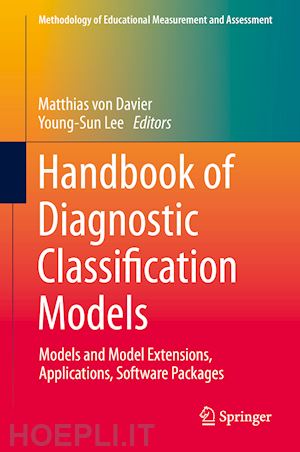
Questo prodotto usufruisce delle SPEDIZIONI GRATIS
selezionando l'opzione Corriere Veloce in fase di ordine.
Pagabile anche con Carta della cultura giovani e del merito, 18App Bonus Cultura e Carta del Docente
This handbook provides an overview of major developments around diagnostic classification models (DCMs) with regard to modeling, estimation, model checking, scoring, and applications. It brings together not only the current state of the art, but also the theoretical background and models developed for diagnostic classification. The handbook also offers applications and special topics and practical guidelines how to plan and conduct research studies with the help of DCMs.
Commonly used models in educational measurement and psychometrics typically assume a single latent trait or at best a small number of latent variables that are aimed at describing individual differences in observed behavior. While this allows simple rankings of test takers along one or a few dimensions, it does not provide a detailed picture of strengths and weaknesses when assessing complex cognitive skills.
DCMs, on the other hand, allow the evaluation of test taker performance relative to a potentially large number of skill domains. Most diagnostic models provide a binary mastery/non-mastery classification for each of the assumed test taker attributes representing these skill domains. Attribute profiles can be used for formative decisions as well as for summative purposes, for example in a multiple cut-off procedure that requires mastery on at least a certain subset of skills.
The number of DCMs discussed in the literature and applied to a variety of assessment data has been increasing over the past decades, and their appeal to researchers and practitioners alike continues to grow. These models have been used in English language assessment, international large scale assessments, and for feedback for practice exams in preparation of college admission testing, just to name a few.
Nowadays, technology-based assessments provide increasingly rich data on a multitude of skills and allow collection of data with respect to multiple types of behaviors. Diagnostic models can be understood as an ideal match for these types of data collections to provide more in-depth information about test taker skills and behavioral tendencies.
Dr. Lee is an Associate Professor in the program of Measurement, Statistics & Evaluation, in the Department of Human Development at Teachers College, Columbia University. She received her Ph.D. in Quantitative Methods at the University of Wisconsin-Madison, with a minor in Statistics. Her research interests are primarily on psychometric approaches to solving practical problems in educational and psychological testing. Her areas of expertise include topics such as development and applications of diagnostic classification models, item response theory, latent class models, and analytical methodologies used in large scale assessments. In addition to her own research, Dr. Lee collaborates on various projects on the use of latent variable models for purposes of scale development/test construction and for validity studies.











Il sito utilizza cookie ed altri strumenti di tracciamento che raccolgono informazioni dal dispositivo dell’utente. Oltre ai cookie tecnici ed analitici aggregati, strettamente necessari per il funzionamento di questo sito web, previo consenso dell’utente possono essere installati cookie di profilazione e marketing e cookie dei social media. Cliccando su “Accetto tutti i cookie” saranno attivate tutte le categorie di cookie. Per accettare solo deterninate categorie di cookie, cliccare invece su “Impostazioni cookie”. Chiudendo il banner o continuando a navigare saranno installati solo cookie tecnici. Per maggiori dettagli, consultare la Cookie Policy.